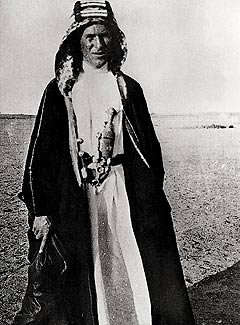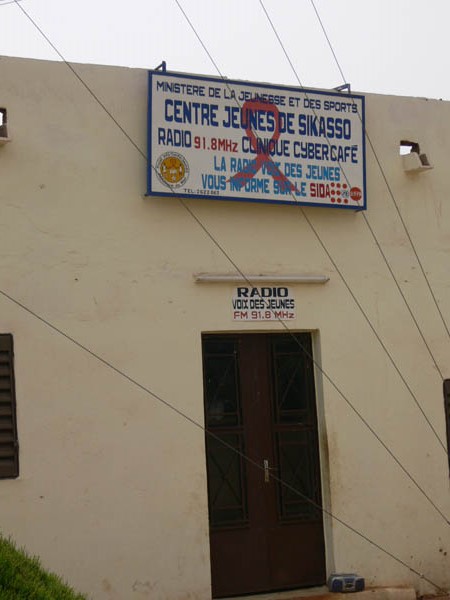T. E. Lawrence (1888-1935)
 "Sometimes these selves would converse in the void; and then madness was very near, as I believe it would be near the man who could see things through the veils at once of two customs, two educations and two environments."
"Sometimes these selves would converse in the void; and then madness was very near, as I believe it would be near the man who could see things through the veils at once of two customs, two educations and two environments."
BUT: Isn't that the job description for an anthropologist?
Next: On to Language
 It's important to say that the version of anthropology I've given in the past dozen or so pages is in some ways very dated. It's the version I lived...and the version I wanted to live. But, in some ways it's very different from the experience of young anthropologists today. Much current anthropology, perhaps most, is done close to home. My guess is that the majority of students getting Ph. D.s in anthropology in the United States today are working in communities located in the US or in their home countries, often with communities they are already members of or have connections to.
It's important to say that the version of anthropology I've given in the past dozen or so pages is in some ways very dated. It's the version I lived...and the version I wanted to live. But, in some ways it's very different from the experience of young anthropologists today. Much current anthropology, perhaps most, is done close to home. My guess is that the majority of students getting Ph. D.s in anthropology in the United States today are working in communities located in the US or in their home countries, often with communities they are already members of or have connections to.
Even for anthropologists working in distant locations, the rest of the world is much closer. When I lived and did fieldwork in Africa starting in the 1979, getting to field locations was difficult and once you were there, communication with people at home was very slow. The only way to communicate was by mail and a letter from Ouahigouya or Sikasso (two towns where I lived) took a minimum of two weeks to arrive in the U.S.
 We did have up to date news because we had short wave radios (radios that could receive special high frequency broadcasts from thousands of miles away) and could listen to the BBC, RFI (Radio France Internationale), and Voice of America (and occasionally Radio Moscow World Service, the station of the old Soviet Union, for a bit of variety). The picture on the right shows my early 1980s Sony short wave radio (of which I was inordinately proud. It was the height of anthro/Peace Corps cool.). Even if you went to the capital city of Burkina Faso or Mali, it was so difficult and expensive to make a phone call that I never did it (it could cost as much as $50 a minute). I don't think there is anywhere in the world that isolated today. Pretty much any town in the world has either cell phone service or internet cafes, or if it doesn't, there is a regional center not to far away that does. The picture above and left shows the young people's center in Sikasso, Mali. The sign notes that it has a cyber cafe. Of course, that means the photo is old. People in Mali today have little need for cyber cafes. As of 2024, there are more cell phone lines in Mali than there are people. A fun statistic that might make you think about communication is that today, there are more people in the world who have cell phones than there are people with access to flush toilets.
We did have up to date news because we had short wave radios (radios that could receive special high frequency broadcasts from thousands of miles away) and could listen to the BBC, RFI (Radio France Internationale), and Voice of America (and occasionally Radio Moscow World Service, the station of the old Soviet Union, for a bit of variety). The picture on the right shows my early 1980s Sony short wave radio (of which I was inordinately proud. It was the height of anthro/Peace Corps cool.). Even if you went to the capital city of Burkina Faso or Mali, it was so difficult and expensive to make a phone call that I never did it (it could cost as much as $50 a minute). I don't think there is anywhere in the world that isolated today. Pretty much any town in the world has either cell phone service or internet cafes, or if it doesn't, there is a regional center not to far away that does. The picture above and left shows the young people's center in Sikasso, Mali. The sign notes that it has a cyber cafe. Of course, that means the photo is old. People in Mali today have little need for cyber cafes. As of 2024, there are more cell phone lines in Mali than there are people. A fun statistic that might make you think about communication is that today, there are more people in the world who have cell phones than there are people with access to flush toilets.
For me, and for the generations of anthropologists before me, doing fieldwork meant almost total separation from family, friends, and culture. Today, that is no longer the case. To the best of my knowledge, I am the only anthropologist in my department who has spent more than a year in a distant culture without frequent phone calls, visits home, or other interruptions. On the one hand, I'm deeply grateful to have had that opportunity. It shaped my thinking about anthropology and it shaped the person I became. On the other, if I text my (grown) children and they don't respond within a few hours, it drives me crazy...
As I noted above, anthropologists studying their own communities in increasingly common. Although the stereotypical idea is the anthropologist as a (usually white) outsider, "native anthropologists" go back to the earliest days of anthropology. Native anthropology is, of course, a good thing. Members of a culture have insights that outsiders do not and have other advantages including command of language and connections within the culture. However, outsiders have their own advantages. Just as insiders see things that outsiders don't. Outsiders see things that insiders don't. For insiders, many aspects of culture are invisible because they are taken for granted. For outsiders these same things often appear to be obvious and outstanding aspects of culture. An anthropology entirely composed of outsiders or one composed entirely of insiders will be impoverished. We need both. Anthropologists should study their own communities, but they should study other communities too.
Some more about T.E. Lawrence: T. E. (Thomas Edward) Lawrence, often known as Lawrence of Arabia, was an archaeologist, military officer, and diplomat. He had worked in archaeology in Syria and, when WWI broke out, volunteered for the Army and was sent on a covert mission to Egypt. With the goal of undermining the Ottoman empire, he joined the Arab Revolt against the Ottomans. He participated in and sometimes led military operations with Emir Faisal, the leader of the revolt and later King of Iraq. Later, he worked in the foreign office where he was considerably less successful. Lawrence became a celebrity as the result of journalist Lowell Thomas' sensationalized portrayal of him as well as his self portrayal in Seven Pillars of Wisdom, Lawrence's self-congratulatory description of his part in the Arab Revolt. Lawrence has been portrayed in film and on TV many times, most notably by Peter O'Toole in the 1962 classic Lawrence of Arabia.]
 "Sometimes these selves would converse in the void; and then madness was very near, as I believe it would be near the man who could see things through the veils at once of two customs, two educations and two environments."
"Sometimes these selves would converse in the void; and then madness was very near, as I believe it would be near the man who could see things through the veils at once of two customs, two educations and two environments." It's important to say that the version of anthropology I've given in the past dozen or so pages is in some ways very dated. It's the version I lived...and the version I wanted to live. But, in some ways it's very different from the experience of young anthropologists today. Much current anthropology, perhaps most, is done close to home. My guess is that the majority of students getting Ph. D.s in anthropology in the United States today are working in communities located in the US or in their home countries, often with communities they are already members of or have connections to.
It's important to say that the version of anthropology I've given in the past dozen or so pages is in some ways very dated. It's the version I lived...and the version I wanted to live. But, in some ways it's very different from the experience of young anthropologists today. Much current anthropology, perhaps most, is done close to home. My guess is that the majority of students getting Ph. D.s in anthropology in the United States today are working in communities located in the US or in their home countries, often with communities they are already members of or have connections to.  We did have up to date news because we had short wave radios (radios that could receive special high frequency broadcasts from thousands of miles away) and could listen to the BBC, RFI (Radio France Internationale), and Voice of America (and occasionally Radio Moscow World Service, the station of the old Soviet Union, for a bit of variety). The picture on the right shows my early 1980s Sony short wave radio (of which I was inordinately proud. It was the height of anthro/Peace Corps cool.). Even if you went to the capital city of Burkina Faso or Mali, it was so difficult and expensive to make a phone call that I never did it (it could cost as much as $50 a minute). I don't think there is anywhere in the world that isolated today. Pretty much any town in the world has either cell phone service or internet cafes, or if it doesn't, there is a regional center not to far away that does. The picture above and left shows the young people's center in Sikasso, Mali. The sign notes that it has a cyber cafe. Of course, that means the photo is old. People in Mali today have little need for cyber cafes. As of 2024, there are more cell phone lines in Mali than there are people. A fun statistic that might make you think about communication is that today, there are more people in the world who have cell phones than there are people with access to flush toilets.
We did have up to date news because we had short wave radios (radios that could receive special high frequency broadcasts from thousands of miles away) and could listen to the BBC, RFI (Radio France Internationale), and Voice of America (and occasionally Radio Moscow World Service, the station of the old Soviet Union, for a bit of variety). The picture on the right shows my early 1980s Sony short wave radio (of which I was inordinately proud. It was the height of anthro/Peace Corps cool.). Even if you went to the capital city of Burkina Faso or Mali, it was so difficult and expensive to make a phone call that I never did it (it could cost as much as $50 a minute). I don't think there is anywhere in the world that isolated today. Pretty much any town in the world has either cell phone service or internet cafes, or if it doesn't, there is a regional center not to far away that does. The picture above and left shows the young people's center in Sikasso, Mali. The sign notes that it has a cyber cafe. Of course, that means the photo is old. People in Mali today have little need for cyber cafes. As of 2024, there are more cell phone lines in Mali than there are people. A fun statistic that might make you think about communication is that today, there are more people in the world who have cell phones than there are people with access to flush toilets.